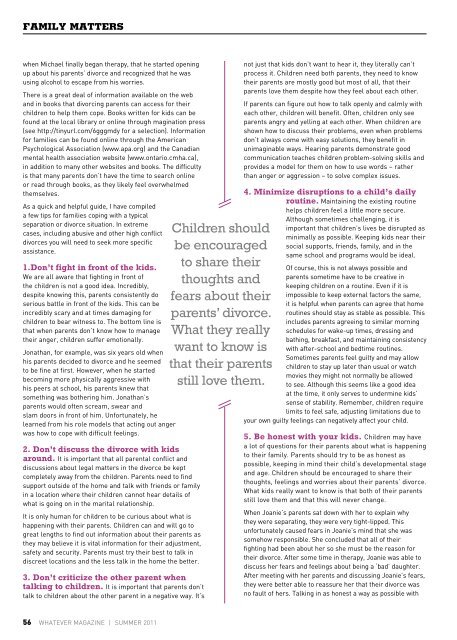the art of success - Whatever Magazine
the art of success - Whatever Magazine
the art of success - Whatever Magazine
You also want an ePaper? Increase the reach of your titles
YUMPU automatically turns print PDFs into web optimized ePapers that Google loves.
family matters<br />
when michael finally began <strong>the</strong>rapy, that he st<strong>art</strong>ed opening<br />
up about his parents’ divorce and recognized that he was<br />
using alcohol to escape from his worries.<br />
<strong>the</strong>re is a great deal <strong>of</strong> information available on <strong>the</strong> web<br />
and in books that divorcing parents can access for <strong>the</strong>ir<br />
children to help <strong>the</strong>m cope. Books written for kids can be<br />
found at <strong>the</strong> local library or online through magination press<br />
(see http://tinyurl.com/6gggmdy for a selection). Information<br />
for families can be found online through <strong>the</strong> american<br />
Psychological association (www.apa.org) and <strong>the</strong> Canadian<br />
mental health association website (www.ontario.cmha.ca),<br />
in addition to many o<strong>the</strong>r websites and books. <strong>the</strong> difficulty<br />
is that many parents don’t have <strong>the</strong> time to search online<br />
or read through books, as <strong>the</strong>y likely feel overwhelmed<br />
<strong>the</strong>mselves.<br />
as a quick and helpful guide, I have compiled<br />
a few tips for families coping with a typical<br />
separation or divorce situation. In extreme<br />
cases, including abusive and o<strong>the</strong>r high conflict<br />
divorces you will need to seek more specific<br />
assistance.<br />
1.don’t fight in front <strong>of</strong> <strong>the</strong> kids.<br />
we are all aware that fighting in front <strong>of</strong><br />
<strong>the</strong> children is not a good idea. Incredibly,<br />
despite knowing this, parents consistently do<br />
serious battle in front <strong>of</strong> <strong>the</strong> kids. this can be<br />
incredibly scary and at times damaging for<br />
children to bear witness to. <strong>the</strong> bottom line is<br />
that when parents don’t know how to manage<br />
<strong>the</strong>ir anger, children suffer emotionally.<br />
Jonathan, for example, was six years old when<br />
his parents decided to divorce and he seemed<br />
to be fine at first. however, when he st<strong>art</strong>ed<br />
becoming more physically aggressive with<br />
his peers at school, his parents knew that<br />
something was bo<strong>the</strong>ring him. Jonathan’s<br />
parents would <strong>of</strong>ten scream, swear and<br />
slam doors in front <strong>of</strong> him. Unfortunately, he<br />
learned from his role models that acting out anger<br />
was how to cope with difficult feelings.<br />
2. don’t discuss <strong>the</strong> divorce with kids<br />
around. It is important that all parental conflict and<br />
discussions about legal matters in <strong>the</strong> divorce be kept<br />
completely away from <strong>the</strong> children. Parents need to find<br />
support outside <strong>of</strong> <strong>the</strong> home and talk with friends or family<br />
in a location where <strong>the</strong>ir children cannot hear details <strong>of</strong><br />
what is going on in <strong>the</strong> marital relationship.<br />
It is only human for children to be curious about what is<br />
happening with <strong>the</strong>ir parents. Children can and will go to<br />
great lengths to find out information about <strong>the</strong>ir parents as<br />
<strong>the</strong>y may believe it is vital information for <strong>the</strong>ir adjustment,<br />
safety and security. Parents must try <strong>the</strong>ir best to talk in<br />
discreet locations and <strong>the</strong> less talk in <strong>the</strong> home <strong>the</strong> better.<br />
3. don’t criticize <strong>the</strong> o<strong>the</strong>r parent when<br />
talking to children. It is important that parents don’t<br />
talk to children about <strong>the</strong> o<strong>the</strong>r parent in a negative way. It’s<br />
56 whateVer magazIne | SUmmer 2011<br />
children should<br />
be encouraged<br />
to share <strong>the</strong>ir<br />
thoughts and<br />
fears about <strong>the</strong>ir<br />
parents’ divorce.<br />
What <strong>the</strong>y really<br />
want to know is<br />
that <strong>the</strong>ir parents<br />
still love <strong>the</strong>m.<br />
not just that kids don’t want to hear it, <strong>the</strong>y literally can’t<br />
process it. Children need both parents, <strong>the</strong>y need to know<br />
<strong>the</strong>ir parents are mostly good but most <strong>of</strong> all, that <strong>the</strong>ir<br />
parents love <strong>the</strong>m despite how <strong>the</strong>y feel about each o<strong>the</strong>r.<br />
If parents can figure out how to talk openly and calmly with<br />
each o<strong>the</strong>r, children will benefit. Often, children only see<br />
parents angry and yelling at each o<strong>the</strong>r. when children are<br />
shown how to discuss <strong>the</strong>ir problems, even when problems<br />
don’t always come with easy solutions, <strong>the</strong>y benefit in<br />
unimaginable ways. hearing parents demonstrate good<br />
communication teaches children problem-solving skills and<br />
provides a model for <strong>the</strong>m on how to use words – ra<strong>the</strong>r<br />
than anger or aggression – to solve complex issues.<br />
4. Minimize disruptions to a child’s daily<br />
routine. maintaining <strong>the</strong> existing routine<br />
helps children feel a little more secure.<br />
although sometimes challenging, it is<br />
important that children’s lives be disrupted as<br />
minimally as possible. Keeping kids near <strong>the</strong>ir<br />
social supports, friends, family, and in <strong>the</strong><br />
same school and programs would be ideal.<br />
Of course, this is not always possible and<br />
parents sometime have to be creative in<br />
keeping children on a routine. even if it is<br />
impossible to keep external factors <strong>the</strong> same,<br />
it is helpful when parents can agree that home<br />
routines should stay as stable as possible. this<br />
includes parents agreeing to similar morning<br />
schedules for wake-up times, dressing and<br />
bathing, breakfast, and maintaining consistency<br />
with after-school and bedtime routines.<br />
Sometimes parents feel guilty and may allow<br />
children to stay up later than usual or watch<br />
movies <strong>the</strong>y might not normally be allowed<br />
to see. although this seems like a good idea<br />
at <strong>the</strong> time, it only serves to undermine kids’<br />
sense <strong>of</strong> stability. remember, children require<br />
limits to feel safe, adjusting limitations due to<br />
your own guilty feelings can negatively affect your child.<br />
5. Be honest with your kids. Children may have<br />
a lot <strong>of</strong> questions for <strong>the</strong>ir parents about what is happening<br />
to <strong>the</strong>ir family. Parents should try to be as honest as<br />
possible, keeping in mind <strong>the</strong>ir child’s developmental stage<br />
and age. Children should be encouraged to share <strong>the</strong>ir<br />
thoughts, feelings and worries about <strong>the</strong>ir parents’ divorce.<br />
what kids really want to know is that both <strong>of</strong> <strong>the</strong>ir parents<br />
still love <strong>the</strong>m and that this will never change.<br />
when Joanie’s parents sat down with her to explain why<br />
<strong>the</strong>y were separating, <strong>the</strong>y were very tight-lipped. this<br />
unfortunately caused fears in Joanie’s mind that she was<br />
somehow responsible. She concluded that all <strong>of</strong> <strong>the</strong>ir<br />
fighting had been about her so she must be <strong>the</strong> reason for<br />
<strong>the</strong>ir divorce. after some time in <strong>the</strong>rapy, Joanie was able to<br />
discuss her fears and feelings about being a ‘bad’ daughter.<br />
after meeting with her parents and discussing Joanie’s fears,<br />
<strong>the</strong>y were better able to reassure her that <strong>the</strong>ir divorce was<br />
no fault <strong>of</strong> hers. talking in as honest a way as possible with




